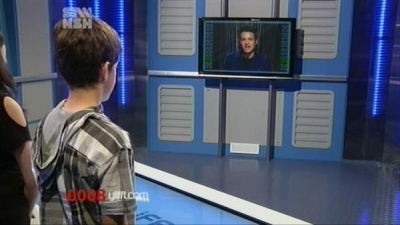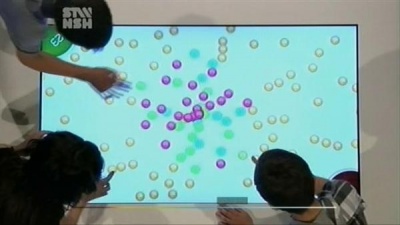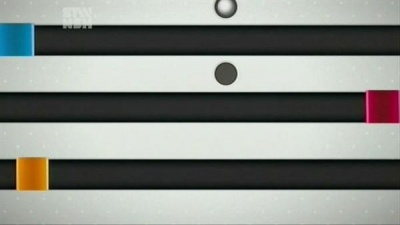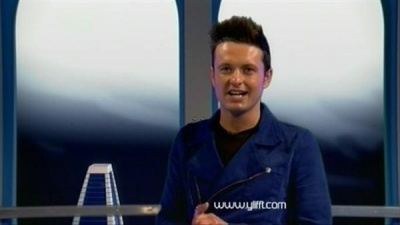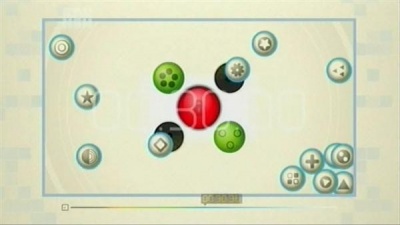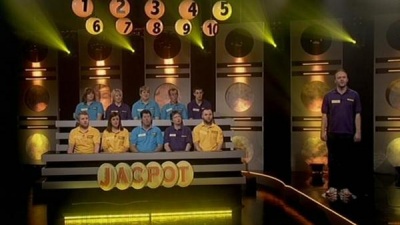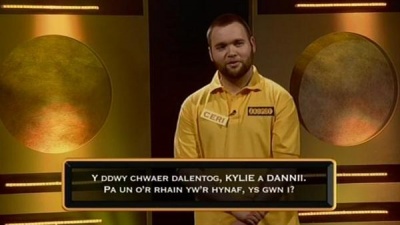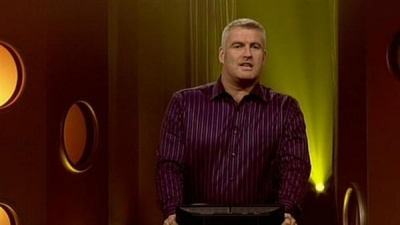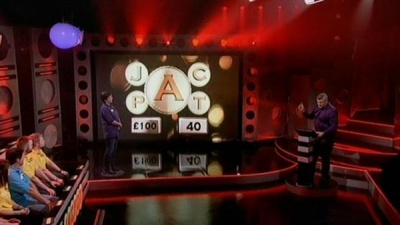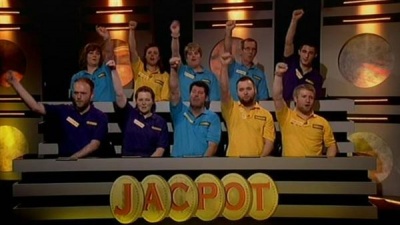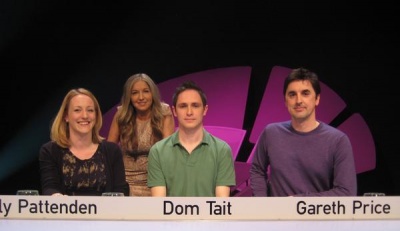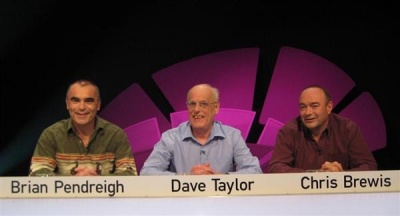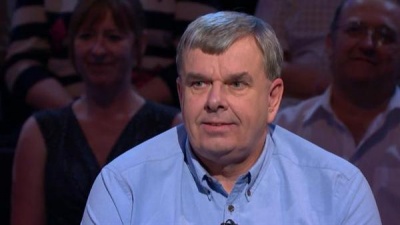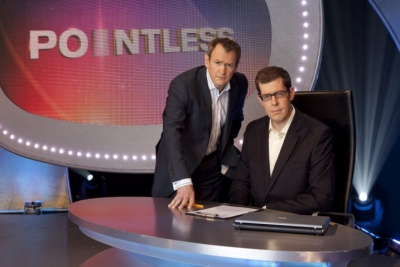Weaver's Week 2012-12-09
Last week | Weaver's Week Index | Next week
In this week's Week, we go Welsh with reviews of Y Lifft and Jacpot, and will Mastermind pay for perfection?
For a number of years, the Week has been mildly irritated that The Cable Corp. only offers Welsh-language channel S4C to viewers in Wales. At one point, we were told that there was "no demand" for the channel in the rest of the UK, which was a bizarre statement, because we'd just said we demanded it. Anyway, all this changed at the beginning of last month, and we've been spending literally some time watching S4C and some of its leading games.
For completeness, we should note that The Cable Corp. has also made Gaelic-language channel BBC Alba available outside Scotland. We haven't found it showing anything we've not previously reviewed. We should also note that we tried to get into the recent series of agricultural reality show Fferm Ffactor, but came to the conclusion that joining halfway through doesn't work, and we'll try harder next year.
Contents |
Y Lifft
Boomerang for S4C, 5.40 Wednesdays from 12 September
S4C makes and broadcasts programmes for all ages. Part of the schedule on Wednesdays is Y Lifft, a big-prize game in S4C terms. Teams of three youngsters are going to ascend up the biggest tower block in Wales, stopping every ten floors for a challenge. If they can complete all seven challenges correctly and in time, they stand to win £300 in vouchers. OK, it's a virtual tower, and they won't even leave the lift, but the prize is very real.
All of the challenges are done on a big touchscreen table, and there's a relatively small pool of games, so each challenge comes round fairly regularly. Now, because this programme is made in Welsh, we have to rely on the subtitles to work out what's going on. Except, Y Lifft must be the one S4C programme not to carry subtitles, so we're having to guess a bit.
The first challenge is one we only sort of understand. Coloured balls emerge from the middle of the screen, and after a short while they turn orange. What the players must do is drag the balls of their colour into their corner of the screen. Each ball going into the corner gives the player a credit, and the score gives both the number of balls into the corner and the number of the right colour. This seems to have an effect on how difficult the player's solo challenge is, but we're not quite sure how everything hangs together.
As the show progresses, solo and team challenges alternate, and we're more sure of the rules. There's the "drop a ball down some moving holes" game, which is like one they could have played with real balls on The Crystal Maze, and the computer graphic isn't as satisfactory as real balls dropping down real holes. There's "count how many cubes are in this structure", made somewhat easier by the way the cubes fall down from the top of the screen, and made somewhat more difficult by the complexity level from game one.
There's a pathfinder game, in which players are shown a route from top to bottom, and must retrace it, almost like they do in The Cube. There's one where the players make bits of a pattern disappear, and must very quickly count the number of a particular shape left in it. There's one involving an electrical circuit, aiming to isolate various floating balls into their own segment. There's a tangram puzzle, where the player is to rebuild a square having seen how it's done. And there's one where a ball bounces around a ring, turning lights on or off, and the idea is to leave all the lights off (or on, we're not sure). The final game is always "Y Cod" (the code), in which the team plays the old Mastermind board game with twelve symbols, trying to place four of them correctly. It's rare that they fail this task.
As we mentioned, some of the games are played by the team. Success means the lift will continue to ascend the Tallest Tower in Wales without penalty. But failure will cost the team. Literally: failing the first team game will see £50 whipped away from the prize fund, failing the second challenge costs £100. And failure in an individual game means that player will leave the lift at once. What's the Welsh for ta-ta? "Ta-ta." It is possible for players to be bought back in the game, if the remaining team members (or member) decides so, and is willing to pay £100 per person.
Host Owain Williams may have a swift wit, and be making some of the best jokes in the country, but our Welsh isn't up to understanding them. We're more certain that he looks like Declan Donnelly circa 1994, and we're sure he's a better singer.
Y Lifft works as a television entertainment. The obvious comparison is with another 1994 artefact, Incredible Games, which launched David Walliams onto an unsuspecting world. Incredible Games owed a clear debt to The Crystal Maze, with very physical challenges, and a rudimentary scoring system. Y Lifft is also a series of discrete challenges, but we don't get the feeling that it's quite so much a team game, more a collection of individuals who sometimes work together.
And there's an elephant in the lift. Y Lifft is designed as a second screen show. While the contenders are playing their games on television, youngsters at home have the opportunity to play exactly the same games on Y Lifft's website. All of the challenges work on a touch-screen, and they all work on a computer or tablet. The best performers over the series will win some nifty electronic prizes, and there might well be rewards for a single week. This does slightly compromise the broadcast programme: each challenge has to be given the full minute to play, and even if the team on screen finds the path in 25 seconds (a regular event), children at home need to be given the full minute. The host has to fill, chat to the contestants or recap the prizes, and that feels more than a little artificial.
It's not the greatest second-screen programme: we've not tried it, but it would be difficult to watch Y Lifft on the television programme and play along on the computer. The show is very carefully produced, the web game is mostly confined to the beginning and end of the show, making it possible to create a shorter edit for airing over the summer. As a television show, as a web game, Y Lifft works: the melding of the two might require a little work before series two.
Jacpot
Tinopolis for S4C, 8.30 Fridays to 23 November
Thanks to a slight foul-up at our end, this review is based solely on the programme of 23 November. And thanks to the internet memory tapes, we can confirm this really is a Welsh-language version of "Jackpot", the Bob Stewart Productions show popular in North America in the 1980s.
For this standalone series, there are twelve people in the studio. One is host Rhodri Ogden Williams, dressed in a spectacularly purple shirt. Ten of them are in a stand, dressed in polo shirts, coloured yellow or purple or turquoise, and they're sat beneath a light showing a number. And one final person stands to their side. This is the solo player, hoping to win big.
The solo player will pick one of the others – by name or number, the two are as interchangeable as they are on Deal or No Deal. Their chosen person will stand up, and (usually) declaim, "Dim Jacpot", which translates as "Big prize for the stupid." (riffles through dictionary.) Er, we mean, "I'm not the Jackpot". They'll then go on and ask a question, usually in the form of a rhyme, and usually with two possible answers.
For instance, "The two singing sisters, Kylie and Dannii. Which one is older: do tell me, can ye?" (It makes a better rhyme in Welsh.) Host Rhodri repeats the question, and the player answers. The objective is to give the correct answer, obviously, because a correct answer will pop £25 into the pot. An incorrect answer will see the solo player and the person asking the original question swapping places, and the pot emptied of money.
On occasion, the chosen person will stand up, raise their arm, and shout, "Jacpot!" This is a more difficult question, with three possible answers, and worth £50. As well as the reward for a correct answer, the jackpot question qualifies the solo player for the prize round. For reasons that made good sense when the show was devised in the 1980s, the jackpot question can only be taken after five of the other posers have been asked, and the solo player has the option not to take it when they first find it. This ability to defer one's luck is more than a little unusual to modern eyes, and it probably owes more to do with not paying out too much money than it does to having a coherent game. But the player gets something in this bargain: once the jackpot question has been found, everyone's question is worth £50, not just the jackpot stumper.
Eventually, the jackpot question will be taken. A wrong answer, the players swap, a new set of questions is issued, and it's five questions before the next jackpot will be asked.
Eventually, the jackpot question will be taken and correctly answered. This qualifies the player to the quick-fire jackpot round. Rhodri will ask a series of questions, and the player must give six correct answers to add £1000 to their prize. If they don't quite make it, they'll earn £100 per correct answer. This is on top of whatever they've won in the qualifying round, so a decent prize winner will take home £1200 from their own efforts. Win or lose, the solo player drops out, and is replaced by someone else, and another game begins.
We're going to need to watch more than one episode of Jacpot to appreciate all of its nuances and foibles. The theme music is instantly memorable: a male voice choir performing a hum, and then shouting "Jacpot!" in a nice loud voice. It almost bears repetition as a sting throughout the programme, though when we heard it four times in as many minutes, it wore a little thin. From a first viewing, we're seeing a programme that generates a lot of fun, and Rhodri is able to ramp up the tension when it's needed. By national standards, it's not a big budget production, and the prizes aren't massive, but it's good entertainment for a Friday evening.
Only Connect
SF2: Scribes v Wordsmiths
"If ignorance is bliss, prepare to meet some very unhappy people." One of the Scribes has been attacked by a scorpion, one of the Wordsmiths has donated 94 pints of blood. That's almost ninety-four armsful! The plans are to "score lots of points" and "have a big lead going into Missing Vowels". We've had some constructive feedback, asking for more scores in our recaps, so that's what we'll give.
Let's play the quiz. Scribes have been asked to bat, and have some very large things. Hyper things, in fact, and the "hypersonic" clue they didn't need was on University Challenge. Will the Wordsmiths take a shot at their question? Cheney's hunting incident, Bobby Thomson's home run, the assassination of Franz Ferdinand? All shots heard around the world, tying at 2-2.
Music for the Scribes: it's all a bit Classic FM, this, as one of the Scribes notes. "Music for young people?" is not the specific connection. The Wordsmiths have it: music on the theme of another composer, "Fantasia on a Theme by Thomas Tallis", and "Young Person's Guide to the Orchestra" also appeared on UC. What a question exchange we have here. Places and people for the Wordsmiths, perhaps the locations of buried hearts. Two points, they're 5-2 up.
"Yesterday" is the most unhelpful clue possible, though Benzene ring and "Kubla Khan" don't help much. We're stumped, the Scribes plump for "circular formations" which isn't allowed, but things inspired by dreams is over for a bonus. On their own question, it's pictures: a purple flower, some sky with sun peeking through, a plastic snake, and some electrical apparatus sparking. Rainbows? Not sure. Prefaced by nationalities? No, they're all a "Jacob's ladder". Wordsmiths lead by 6-2.
To the Sequences, where "World Space Patrol" is followed by "World Aquanaut Security Patrol" and "International Rescue". Gerry Anderson is clearly the link, but what came after Thunderbirds? These Scribes are too young, and the Wordsmiths can't remember what Joe 90 worked for. Spectrum the answer, because it's actually Captain Scarlet. For the Wordsmiths, it's some sort of democratic reform: payment for members, ending the property requirement, secret ballot. It's not "universal sufferage", but "vote for every man". Not universal, inspiring a brief Victorian rant from the host. Still 6-2.
Pictures for the Scribes: a catamaran, banana, macaw: alternating letters are A, so cat and hat are fine. Two points. Over at Wordsmiths, it's 9: Prince Rupert's Tower, 13: Cannon, 18: Liver bird. Symbols of Everton, Arsenal, Liverpool, so what about Manchester United? 19: Red devil, a well-earned two points, extending their lead to 8-4.
For the Scribes, it's Adams: son, then Harrison: grandson, and Roosevelt: 5th cousin. Captain Dom Tait might have had it after one clue, but took all three to confirm it's relations between US presidents of the same surname. Bush: son is worth two points. On the Wordsmiths, there's an unusual typeface with the clue split on two lines. 24/06 1987, 25/06 1987, 17/06 2345. Dates that use no repeated digit, and the next is 18/06 2345. The typeface is a red herring, the Wordsmiths lead 8-6.
Grids 249 and 248 on the website, and the Wordsmiths will want to extend their lead here. They've types of carriage, they've Carry On actors, and they've got towns on the Isle of Man quite quickly. They're sure there's carriages, and reckon there's a set of architects as well. They think, they plot, they ponder, they fail to resolve the grid. Indeed, there are horse-drawn carriages: the last group evades them. Types of tie-knot. Five points!
The Scribes very quickly get some Luc Besson films, and then they have Spanish cities. There's banks, there's draught horses, and in absolutely no time at all, they've solved the grid. Did they do that without making a single error? They did, you know. Inland Spanish cities and Banks owned by foreigners were the formal answers, but perfection is attained. Ten points!
Which leaves the Scribes ahead by 16-13. The Wordsmiths may be in trouble, leading by minus three points. Charities founded in the UK extends their deficit by 3-1, and Medical conditions and their common names goes to the Scribes by 2-0. Celebrity children with unusual names, to the Scribes by 3-0. The curtain comes down during Songs from musicals, just one point to the Scribes, but they're clear winners, 25-14.
The Wordsmiths return to the third-place play-off next week, the Scribes to the final in a fortnight.
This Week And Next
There are reasons why Mastermind gets a higher billing this week.
- Sam Goodyear (Soviet Union under Stalin 1924-39) gets off to a rocky start, and his two-minute plan turns to liquid under the hot studio lights. 8 (1) is not going to be a winning start, and the contender answers what he knows, passes on the rest, and finishes on a perfectly decent 22 (6).
- Brig Roooke (novels of William Golding) has a solid round, a few errors here and there, a very creditable 10 (1). The second round: well, the contender scores far more than this column ever has, and finishes on 16 (5).
- Henry Morris (The KLF) has a crack at one of the subjects we'd consider for this show. Drummond and Cauty, the people who burned a million quid as an arts project, and appeared on Top of the Pops dressed as ice cream cones. 13 (0) beats this column by one point. Again, the general knowledge isn't quite there, 19 (4) the final score.
- Andrew Frazer (When the Boat Comes In) is on the television series. The contender's done his homework, and finishes with A Perfect Round! 16 (0). He needs seven in his general knowledge round to win, and seven answers into his round, he's won. The clock continues, the correct answers continue, and we're wondering if he's going to make an error. He's not. He's not! Time expires, and there's one answer left to give. It's an incorrect answer – Ben Elton rather than Alan Bennett – and Andrew Frazer finishes so tantalisingly close to A PERFECT SHOW!!! The final score is a superlative, stonking, wonderful 35 (0).
University Challenge, and Warwick got here with a routine win over Aberdeen; King's qualified through the repêchage, at the expense of local rivals Homerton. And they kept up the scoring in the opening exchanges here, Amber Ace gaining an approving nod from Thumper after deriving a complex medical term from its Greek origins. They were useful on the buzzers, scoring the first five correct answers; but not so hot on the bonuses, answering just one per set.
And that was the chink Warwick could exploit: one starter, three bonuses, that's a third off the lead. Another starter to King's, but then Warwick got a couple, and suddenly the sides were level. A seventy-point lead had gone in the twinkling of an eye; in another twinkling, turned into a Warwick lead of 60. But we knew King's had the better of the buzzers, and if they could get a bit lucky with the bonuses – as they did in a set on the civil rights movement – they just might pull it back. With two and a half minutes to play, the sides were level.
Warwick got the next starter, scored five on human eye defects. One starter went unanswered, another had two incorrect answers. King's got the starter, and scored five on the works of Masefield, to bring the sides level again. King's scored the next starter, and took questions on names beginning and ending on the same letter. They got one, which would help, but won the game when identifying some comets. Which meant King's had won, 185-160. They'd only made 15/33 on bonuses, but have buzzer qualities, and they're great fun to watch.
Congratulations to The Chase, which gets to buy a trophy cabinet because it's won the TV Times award for Favourite Daytime Show. This was a surprise to us, not least because we had completely forgotten that the TV Times was still published, never mind that it had an awards ceremony. Other winners were The Great British Bake Off (editor's choice as Best Programme), Ant and Dec (Favourite Presenters), and Strictly Come Dancing (Favourite Reality show).
The long-running saga of Celador versus Walt Disney Company rumbled on, with a superior court confirming an earlier ruling that Disney owed Celador $319 million (now about £200 million) in profits for Who Wants to be a Millionaire. Disney was appealing against a ruling that it had deliberately understated the success of the show.
A very quiet OFCOM bulletin this week, all we've found is that three people complained about violent behaviour on Strictly Come Dancing. OFCOM's compliance unit blinked, looked through the tapes, and only then burst out laughing. They are having a second look at episodes of 8 Out of 10 Cats and Dick 'n' Dom's Hoopla.
Ratings for the week to 25 November put Strictly Come Dancing in first place, 11.2m saw the peformances. 9.3m for I'm a Celebrity, and 8.35m for The X Factor. Pointless Celebrities was seen by 5.3m, and the Formule First motor race by 5.25m. University Challenge topped BBC2's lists with 3.2m, just ahead of The Chase (3.15m), and Masterchef The Professionals had 3m. Channel 4's biggest was 8 Out of 10 Cats, 1.55m there.
Further up the EPG, I'm a Celeb Now took 1.27m viewers, and a Celebrity Juice repeat had 1.06m. A relatively poor week for Only Connect, a "mere" 915,000 viewers. Put this in context: if someone had said in August that we'd be disappointed by Only Connect "only" getting 915,000, we wouldn't have believed them. Nor would we have believed the prospect of Xtra Factor only getting 680,000, but that's all they got this week. A League of Their Own S1 on The Satellite Channel had 590,000, QI XL on Dave took 545,000, and CBBC's Junior Masterchef was seen by 400,000. New Masterchef Australia finished its run with 265,000 viewers.
Next week: It's the finals of The X Factor (ITV, 7.40 Sunday), Masterchef The Professionals (BBC2, 8pm Thursday), Masterchef Ireland (RTE2, 9.30 Thursday), and Junior Mastermind in Ireland (TV3, 6.40 Sunday). There's a Women of Big Brother special edition of Millionaire (ITV, 6.40 Sunday) with Denise Welch (January) Cheryl Fergison (August) and Alison Hammond (BB3), and celebrity editions of Pointless and Eggheads during the week. Next Saturday's got A Question of Sport BBC Sports Personality special (5.45), Strictly Come Dancing (6.30), and with minor celebrities and Keith Lemon on Take Me Out (ITV, 7.45)
To have Weaver's Week emailed to you on publication day, receive our exclusive TV roundup of the game shows in the week ahead, and chat to other ukgameshows.com readers, sign up to our Yahoo! Group.


